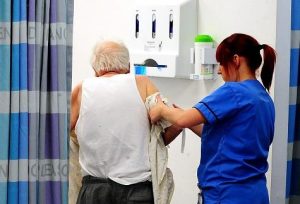Low staffing levels ‘harms elderly care’
The care of the elderly is being compromised in UK hospitals because there are too few nurses, according to the Royal College of Nursing.
Research by the union suggested everything from basic communication to care for the dying was suffering.
And it called for minimum staffing levels to ensure standards improved, arguing one nurse for every seven patients was needed.
But managers said setting arbitrary levels could end up harming care.
The intervention by the RCN comes after a series of damning reports about the services the elderly are receiving.
The Patients Association and Care Quality Commission have both recently published studies detailing “shocking” levels of care.
Ministers have promised to give more powers to nurses as well as improving monitoring to drive up standards.
‘Neglected’
But the union said it was now time to insist on strict staffing levels and stop relying on health care assistants to fill the gaps.
It polled nearly 1,700 nurses – 240 of whom were working on wards with older patients.
The survey showed that while older people’s wards only had one nurse for every nine patients on average, general wards, at 6.7 patients per nurse, and children’s wards, at 4.2, were much better staffed.
Respondents said low staffing meant care suffered in a variety of ways.
Eight in 10 said basic support, such as talking and comforting patients, was compromised, while a third said they did not have time to help people properly with eating and drinking.
Nearly one in five also said care for dying patients was neglected.
The research looked at the use of guaranteed staffing rules in places such as Australia and the US and concluded they were needed in the UK.
It recommended there should be one registered nurse for every five to seven patients in the NHS.
Peter Carter, the RCN’s general secretary, said: “Patients on older people’s wards are being let down by systemic failings in our hospitals.
“Despite working tirelessly to provide patients with high quality care, nurses in these settings have repeatedly told us that they are unable to do this because of pressures caused by short staffing.”
Michelle Mitchell, of Age UK, agreed: “When health care professionals are understaffed and consequently focused on task-based, rather than person-based, care, the dignity and care of older patients can be severely jeopardised.”
But Dean Royles, director of NHS Employers, said: “Mandatory staffing levels cannot guarantee safe care.
“We do not believe that imposing a crude system of staffing ratios is the right way to tackle poor care.
“Arbitrary ratios could limit organisations’ ability to plan care in a way that is best for the patient. The last thing we want is a minimum standard becoming a ceiling rather than a floor.”
